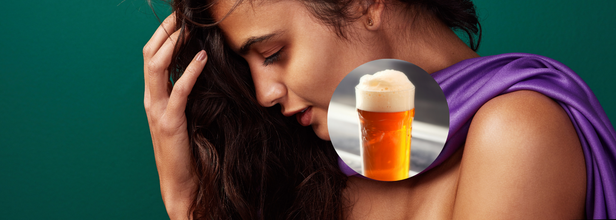
How to Add Beer to Your Hair Routine
This Surprising Chilled Item Can Give You Shiny, Smooth Hair
As the air begins to turn crisp with the changing season, I can’t help but notice the familiar struggles with my hair. My once smooth locks are now plagued with dryness, frizz and a general lack of shine. With every tug of a brush, my frustration grows. Like many, I’ve tried various products and routines, but a tried-and-true hair routine often feels elusive. After all, the same routine won’t work for everyone because there are so many factors—environment, hair type, and even diet.
But here’s what I’ve learned: starting with the basics and experimenting with home remedies can make all the difference. Here’s a deep dive into what can bring your hair back to life, from nourishing shampoos to the unexpected benefits of beer.
If you’re feeling the same seasonal struggle, the first step in creating a hair routine that works for you is choosing the right shampoo and conditioner. Every hair type—whether straight, wavy, curly, or coiled—has unique needs, and finding products that suit yours can set the foundation for healthy hair. Hydrating shampoos are ideal for dry or frizzy hair, while volumizing formulas can help thin hair appear thicker. It’s all about what your hair needs to thrive. Once you’ve got the basics down, consider layering in other remedies to get that extra bit of shine and manageability.
Beer Rinse: Unconventional Yet Popular Choice?
Beer as a hair treatment? It may sound unusual, but beer has been used as a rinse for years due to its potential conditioning effects. Though clinical evidence on its hair benefits is limited, beer contains several nutrients including calcium, protein, selenium, and vitamins D and E which are beneficial for overall health. According to Dr. Ryan Welter, founder and CEO of Regeneris Medspa & Cosmetic Surgery and the New England Center for Hair Restoration, based in Massachusetts, told Fox News Digital, "Beer doesn’t directly stimulate hair growth, but when applied as a rinse, it may provide a conditioning effect by binding to the protein structure of the hair strands, giving them a temporary boost in smoothness and shine."
How to Add Beer to Your Hair Routine
Frequency
If you want to give beer a try, you can incorporate it into your hair-washing routine. It’s best to do so in moderation, perhaps once a week as overuse could lead to dryness due to its alcohol content.
Application
After shampooing, pour a cup of flat, room-temperature beer through your hair. Let it sit for about five minutes to allow the beer’s proteins to bind with your hair.
Rinse
Finish with a quick rinse to remove excess beer without washing away the conditioning effect.
While the idea of beer as a hair rinse might seem quirky, many people swear by its ability to bring out natural shine and tame frizz- though it’s best suited for occasional use.
DIY Remedies for Healthy Hair
While store-bought products offer excellent support, at-home remedies have proven benefits that are worth exploring. Many people incorporate natural ingredients to nourish their hair- think coconut oil for moisture, avocado for shine and even aloe vera for scalp health. One remedy I recently encountered was surprising but intriguing: beer.
For those not quite sold on beer, several other natural ingredients can work wonders. Essential oils like rosemary, lavender, and peppermint are popular choices. According to Dr. Brooke Jeffy, a board-certified dermatologist from Scottsdale, Arizona, previously told Fox News Digital, these oils are believed to help promote hair growth by stimulating the scalp and improving circulation.
For an alcohol-free alternative to beer try an apple cider vinegar rinse. Mixing one part apple cider vinegar with three parts water and using it as a rinse can remove buildup on the scalp, leaving your hair shiny and fresh. This mixture’s acidity helps balance the scalp’s pH and prevents excessive oil production, perfect for those struggling with greasy roots.
How Often to Wash and Oil your Hair?
Finding the right balance in your wash routine is essential. Washing too frequently can strip the hair of natural oils, leading to dryness, while infrequent washing can result in oil buildup. According to Dr. Welter, it’s essential to monitor your scalp’s health—if it’s too oily, you might experience greasiness or even acne on the scalp, while an overly dry scalp can cause flakiness and dandruff. Adjust your washing schedule based on how your scalp feels, whether it’s once a week or every few days.
Are there Any Downsides of Using Beer for Haircare?
While beer has its benefits, it’s crucial to remember the potential drawbacks. The alcohol content in beer can dry out hair, leading to increased frizz. Additionally, too much protein from beer or other protein-rich treatments can make hair feel gritty or stiff, so it’s essential to use these remedies sparingly. Dr. Welter advises monitoring your hair’s texture and moisture levels to avoid a counterproductive effect.
Every hair type is unique, and what works wonders for one person may not suit another. A little trial and error is often part of the process. Start with a solid foundation by choosing the right shampoo and conditioner, then gradually add in one or two at-home treatments, like beer or essential oils, to see how they work for you. Adjust your wash schedule according to your scalp’s needs, and give your hair the chance to find its natural balance.
© 2024 Bennett, Coleman & Company Limited

